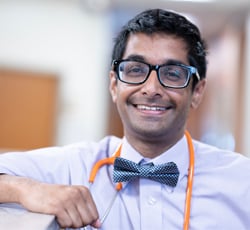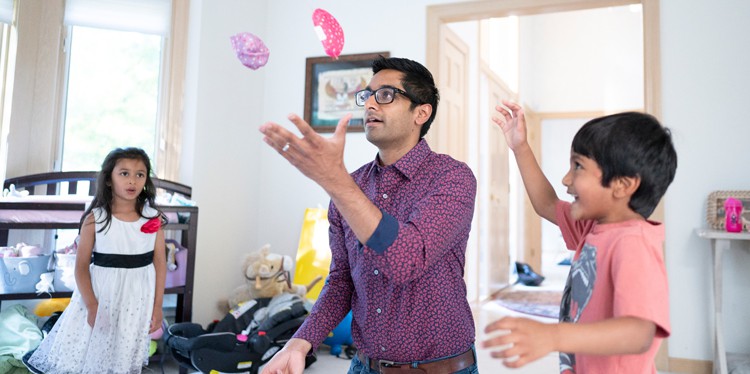We know that fatherhood looks different to every dad. That’s why we’re taking an in-depth look at fatherhood with key experts, regular parents, and everyone in between in this mini-series, “The Fatherhood Experience.”
Meet Dr. Krishnan Subrahmanian. A former high school teacher with a background in public health, he is a husband and father of three children under the age of five and spends his professional time as a pediatrician at Hennepin Healthcare.
What has becoming a dad been like for you?
We have a book about this little bunny who keeps getting asked: “What do you wanna be when you grow up?” The whole family has their own take. But in the end, the bunny says: “I don’t wanna do any of those things. I wanna be a daddy!” I bring this example up because that wasn’t me. To be honest, I never introspected enough to build in the fact that fatherhood would become my life.
Being a father changes one’s identity. We all have dreams, ambitions, and stories. However, being a father makes you realize, this is not a story about me anymore. I am now a supporting character in the story of another. And for someone who was so career oriented, it’s a big shift. But, eventually, you realize that MY story is not the story at hand anymore.
What do you find joyful about fatherhood?
Everything. When my son is able to use the toilet without assistance. When my daughter puts on all her winter clothing, only half backwards! It’s a huge deal. Part of it is, well, it’s a little less I have to do for them. But part of it is like, gosh, we worked hard on learning this and now you’re doing it.
This world we live in, for all its frustrations, sadness and toughness – it’s pretty amazing. To get to relive it again, through the eyes of children is so wonderful.
What are the challenges to being a father?
Oh yeah, there’s a lot. I don’t think fatigue should be underestimated. You can’t get away from your own professional expectations and personal life. So to balance those realities of everyday life with being present is difficult.
We put a lot on dads, a lot on families between financial burdens and commitments. To do that, and have the time and energy to enjoy your kids, it’s a major challenge. Also, the world doesn’t grant the father the opportunity to say “oh, I was late because I was wiping up my child,” or “I can’t make it today because I’m taking care of my kids.”
That’s not a space granted to dads, because it doesn’t fit with the traditional roles. Thank goodness it’s changing. There are greater expectations for the father to be around for the daily routines and care. This helps to redefine gender roles. That’s very important. It allows them to take on the role they want, whatever it may be. It really takes more than two people to manage all of this, so having at least two parents take on the tasks is really great!
How does your experiences as a dad affect your practice as a physician?
Being a pediatrician doesn’t make me any better of a father. But being a father makes me a much better pediatrician. The truth of the matter is that in pediatrics, or medicine, we learn a lot about diseases and processes and dangerous conditions — how to help solve them. We get little instruction in some of the things that matter most, like how you help a kid sleep. How do you help a kid eat and poop and pee? All the things that make up that daily life, you don’t get a ton of training on that.
So now, as a pediatrician, I can bring the lens of what is dangerous, what we should avoid. But probably more valuable are the lessons of “here is what works at midnight, here’s what you can try, here’s other stuff we tried that did – or didn’t work” that’s very valuable for parents.
How can someone be the best dad they choose to be?
An important point here is that each family looks different and understands that this takes as much help as available. If you are a father you can be a part of that, whether you live with your partner or not, whether you are an adoptive parent, part of a same sex relationship, or are a single parent.
As a father, the way we support our partner has a profound effect on the baby and can serve as an important role model.
In the first couple of months, the baby needs milk and particularly if the mother is breastfeeding. It can feel like the baby wants mom and tolerates dad. But understand that there is a connection for you too, you are a voice, a person, a smell that the baby will recognize. Also in those early months, support your partner. It can take an hour to feed the baby. If your partner has to do that every two hours, there is little time left and a lot to do. There is laundry, sterilizing bottles, paying attention to other children and family members.
This support of our partner is not only helpful, it also improves the emotional health of moms, babies and families in the short and long run. With time it serves as an important role modeling for relationship building.
By 3-4 months you are starting to get eye contact, at six months, the connection becomes even more profound. From there on, there is so much you can do to speak with the baby, sing to baby, promote language, act as a role model, developing that relationship and advocating for your child and pushing them outside their comfort zone to try new things.
How can we as a community work to better support dads?
It starts early and often. I talk a lot about how there are no books about this art of fathering. Dads have oftentimes been told, here’s your role as provider/protector. But they’re not instructed on feeding, diaper changing, managing bedtime. How do you be a helpful partner, and father, and role model, and community member? We don’t get to talk about those things enough. We have learned that fathers want this kind of information and they want it even as they are preparing for fatherhood.
Finally we can let people know how special and important the role of “dad” can be. Even myself, who was a teacher and worked with kids, I didn’t understand the joy of fatherhood. Kids are amazing, they are wonderful creatures. Just highlighting that there’s a lot of joy to be had in being a parent, a father. That’s something I never heard as a young man. We have not done a great job of telling that joy, and normalizing it for young men. It’s great to be a dad!
Dr. Subrahmanian is a consulting pediatrician with The Redleaf Center for Family Healing. This new Center provides mental health and parenting support to mothers and fathers with young children zero to five years of age and will celebrate its grand opening this fall.
